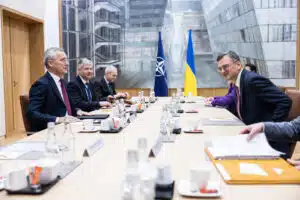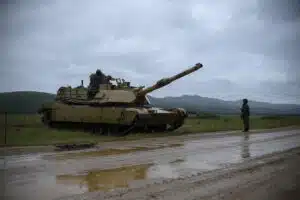Brussels – NATO and Ukraine are trying to close ranks at one of the most difficult times since the Russian invasion of the country began. As Kyiv faces the aftermath of the largest bombardment since the Russian military kicked off its invasion of the country nearly two years ago, the NATO-Ukraine Council met in Brussels this afternoon (Jan. 10) as an extraordinary ambassadorial-level meeting to discuss strengthening Ukrainian air defense against missile and drone bombardment. The Ukrainian government’s request to partners is to increase arms shipments, putting pressure on European capitals to increase defense support against new Russian attacks over the winter.

The ad hoc council meeting convened by NATO Secretary General Jens Stoltenberg was requested by Ukraine itself, following the recent attack using 158 North Korean missiles and Iranian-made Shahed drones to strike all major cities in the country, from Kyiv to Lviv, Odesa to Kharkiv. Of the 158 drones and missiles launched on the morning of Dec. 29, 114 were shot down by Ukrainian flak but the remaining 44 hit civilian buildings and killed more than 30 people. That is why the dossier on strengthening Kyiv’s air defenses could not but be central on the ambassadors’ table, despite the fact that the 31 allies have already provided “significant quantities” of anti-aircraft systems, stressed NATO spokesman Dylan White. “We expect that decisions on further strengthening of air defense capabilities will be accelerated both in terms of modern systems and ammunition,” was the urge of Ukrainian Foreign Minister, Dmytro Kuleba, speaking to Politico.

(credits: Nikolay Doychinov / Afp)
Just two days ago, the German Chancellor, Olaf Scholz, urged other European partners to provide more military aid to Ukraine, even if Berlin still has not given the go-ahead to send the much-needed Taurus cruise missiles. Germany has become the world’s second-largest arms donor country after the United States and from this position, it is trying to pull the other 26 governments into a stronger commitment. “The more successful Ukrainian air defense is, the less likely it is that a Russian missile or drone will accidentally fly into NATO airspace,” Kuleba added, referring to the crossing of Polish airspace by a Russian missile bound for Ukraine as reported by Warsaw in late December. Meanwhile, from Italy came a new green light precisely to send a new tranche of military means, materials, and equipment, thanks to Parliament’s approval of the resolution committing the government to continue with support to Kyiv “in line with the commitments made and with what will be further agreed upon in the EU and NATO frameworks.” A compact majority, in favor also +Europa, Italia Viva, and Azione, abstention of the Democratic Party, against 5 Star Movement and Green and Left Alliance.
English version by the Translation Service of Withub





